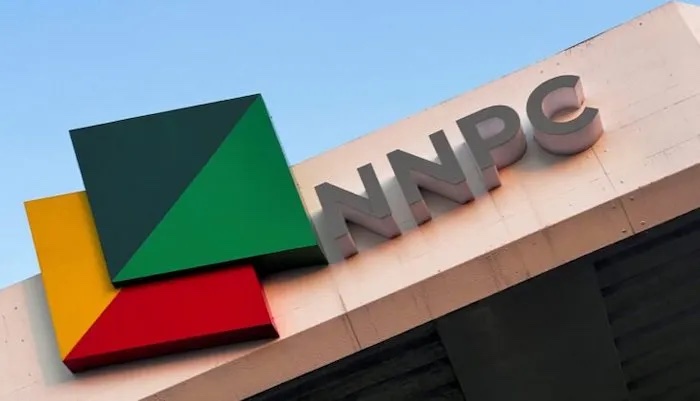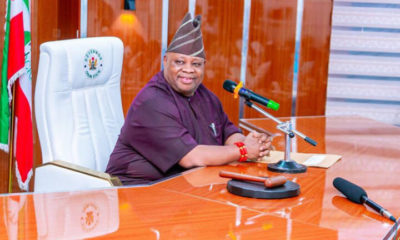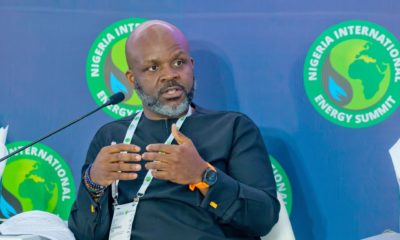Business
Oxford Business Group Signs MoU with LCCI

By Edozie Obasi-Eze
Nigeria’s plans to put the private sector at the heart of the next phase of its economic development will be explored in a forthcoming report by the global research and advisory company Oxford Business Group (OBG).
The Report: Nigeria 2023 will look in detail at the key sectors of the country’s economy with high growth potential, which include agriculture, energy, ICT, and industry.
It will also consider the important role earmarked for public-private partnerships in supporting Nigeria’s infrastructure development, with major projects such as the Lekki Free Zone and the Lekki-Epe road among those in the spotlight.
The openings that are expected to emerge from the African Continental Free Trade Area will be another focal point, with an in-depth analysis provided of the potential that the initiative holds for boosting exports and fostering new trade partnerships.
Other topics set for coverage include a drive underway to encourage innovation and the introduction of tech solutions across the economic sectors, with the aim of galvanising growth in nascent segments, such as fintech.
Read Also >> I Am Ready To Be The Best Spare Tire Of Rivers State – Tonto Dikeh
OBG has signed a new memorandum of understanding (MoU) with the Lagos Chamber of Commerce and Industry (LCCI) as it begins work on The Report: Nigeria 2023. Under the agreement, the LCCI will team up with OBG to produce the Group’s first post-pandemic analysis of Nigeria’s investment opportunities and economic development, and other related content.
The MoU was signed by Wen Qian Chang, Country Director, OBG, and Chinyere Almona, Director General, LCCI.
Almona said that OBG’s new report comes at a time when Nigeria is looking to the private sector to unlock the potential of key legislative reforms put in place in recent years and spearhead a new era of growth.
“These have been challenging times for Nigeria, with recession and high inflation weighing on the country’s economic performance. However, higher oil prices and a rise in post-Covid remittances, are combining to improve the outlook,” she said.
With an eye on the future, she added, “Oxford Business Group is known for producing highly regarded, detailed resources on emerging economies and has consistently provided accurate, in-depth analysis of Nigeria’s economic development over the years.
I look forward to working closely with its representatives to highlight the latest openings across the economy as the country prepares for a new chapter in its growth story.”
Chang said she was delighted to have the LCCI on board for OBG’s 2023 report on Nigeria, with the country looking to build on its strengths, led by an abundant supply of natural resources, a sizeable workforce and a vibrant business scene, in the recovery phase.
“Long a regional powerhouse, Nigeria is now assessing the impact of measures adopted during the pandemic aimed at strengthening resilience and enabling the economy to withstand future shocks,” she said.
On the focus of the Nigeria 2023 report, Chang pointed out, “The private sector is recognised as the linchpin of Nigeria’s economic strength, with businesses ably supported by key organizations such as the Lagos Chamber of Commerce and Industry, which provides a broad range of services aimed at encouraging innovation and growth.
I’m thrilled that our research into the many investment opportunities emerging in Lagos and beyond will benefit from the local knowledge and expertise of its members.”
The Report: Nigeria 2023 will mark the culmination of more than a year of field research by a team of analysts from Oxford Business Group. It will be a vital guide to the many facets of the country, including its macroeconomics, infrastructure, banking and other sectoral developments. OBG’s publication will also contain contributions from leading representatives across the public and private sectors.
The Report: Nigeria 2023 will be available online and in print. It will form part of a series of tailored studies that OBG is currently producing with its partners, alongside other highly relevant, go-to research tools, including ESG and Future Readiness reports, country-specific Growth and Recovery Outlook articles and interviews.
Click here to subscribe to Oxford Business Group’s latest content: http://www.oxfordbusinessgroup.com/country-reports
Business
Marketers In Anguish, As Dangote, NNPC Ltd War Drag Price To N880/litre

The pull of market forces which moved the hands of the Nigerian National Petroleum Company Limited (NNPC Ltd) to reduce the price of Premium Motor Spirit (petrol) to N880 per litre in Lagos and N935 in Abuja appears to be a source of torture to independent markets.
Biztellers reports that the latest price review on Easter Monday saw NNPC retail outlets in Lagos drop from N925 to N880, while those in Abuja adjusted from N950 to N935.
The NNPC Ltd’s price reduction came barely a week after the Dangote Refinery lowered its ex-depot price from N865 to N835 per litre.
ALSO READ: BREAKING: Again, Dangote Cuts Petrol Price To N835 per Litre
In addition, the $20bn refinery also directed its partners like MRS, Heyden, and Ardova to sell a litre of petrol at the rate of N890 instead of N920 in Lagos, N900 in the South West, N910 in the South-South, and N920 in the North East.
Consumers can smile because with the reaction, the NNPC Ltd’s new price in Lagos is N10 lower than what the Dangote Refinery is selling at, which might lead to another reaction, as the price war between the two companies.
Though some NNPC Ltd’s retail outlets were observed selling at the old rate in Lagos, it was gathered that they were given the liberty to exhaust old stock before adjusting to the new prices.
Market sources are of the view that the current price war was ignited by the Federal Government’s implementation of the Naira-for-crude policy.
Business
Gold Prices Hit Historic $3,500 Amid Trump Tariffs, Fed Tensions
Gold soared to a record high of $3,500 an ounce on Tuesday, as mounting fears over a potential U.S. recession and escalating tensions between President Donald Trump and the Federal Reserve drove investors toward the traditional safe-haven asset.
The precious metal briefly touched an all-time high of $3,500.10 an ounce before retreating slightly to trade at $3,467.87.
READ ALSO: JUST IN: Vatican Discloses Cause Of Pope Francis’ Death
The rally marks the latest in a string of record-breaking gains for gold, fueled by a weakening U.S. dollar, sharp declines across global stock markets, and growing concerns over the health of the world economy.
Market sentiment took another hit this week after President Trump ramped up his trade war with China, slapping fresh tariffs on the world’s second-largest economy and intensifying fears of prolonged economic disruption.
Gold has surged more than 30 percent since the start of the year as investors seek refuge from mounting market volatility.
“The rally reflects ongoing recession fears in the U.S. economy and heightened political tensions, especially as President Donald Trump continues to attack Federal Reserve Chair Jerome Powell,” said Rania Gule, senior market analyst at trading group XS.com.
Concerns about the Fed’s independence were further stoked Monday, when Trump publicly lashed out at Powell on social media, branding him a “major loser” for not cutting interest rates — a move the president has repeatedly demanded.
The sharp criticism follows Trump’s recent suggestion that he might attempt to remove Powell from his post.
Business
World Economic Forum Founder Klaus Schwab Steps Down From Board
Klaus Schwab, the founder of the World Economic Forum (WEF), announced his resignation from the board on Monday, marking a significant moment in the organization’s history.
Schwab, who has been at the helm of the WEF for over five decades, confirmed he was stepping down from his position as Chair and leaving the Board of Trustees with immediate effect.
“I have decided to step down from the position of Chair and as a member of the Board of Trustees, with immediate effect,” Schwab said, noting that the decision comes as he approaches his 88th year.
READ MORE: NNPC Ltd Opens Retail Outlet In Bauchi
His resignation follows his stepping down as executive chairman in 2024, when former Norwegian foreign minister Borge Brende took over the day-to-day operations.
In response, WEF appointed Vice Chairman Peter Brabeck-Letmathe as interim chairman while a search committee was formed to find a permanent successor.
The WEF board lauded Schwab’s immense contributions, acknowledging his “outstanding achievements” over his 55-year leadership tenure.
“At a time when the world is undergoing rapid transformation, the need for inclusive dialogue to navigate complexity and shape the future has never been more critical,” the WEF stated.
“Building on its trusted role, the Forum will continue to bring together leaders from all sectors and regions to exchange insights and foster collaboration.”
Schwab, originally from Ravensburg, Germany, founded the precursor to the WEF, the European Management Forum, in 1971.
The first meeting drew fewer than 500 participants, but over the years, Schwab expanded the gathering into a prestigious platform that now attracts thousands of influential figures.
The Davos summit has become synonymous with global power brokers, offering opportunities for high-level networking, discussion, and collaboration on issues affecting the world.
Under Schwab’s leadership, the WEF grew to include regional meetings and established centers dedicated to pressing global topics such as cybersecurity, climate change, and financial systems.
The organization continues to uphold its mission of “improving the state of the world” by fostering dialogue and cooperation.
However, the WEF and Schwab have not been without their critics. Many argue that the forum has become a venue for corporate elites to exert influence over governments, with the term “Davos Man” often used to describe the affluent attendees.
Schwab has also faced the ire of conspiracy theorists, particularly following his promotion of the “Great Reset” following the COVID-19 pandemic.
These theorists have spread misinformation, alleging that Schwab and the WEF are part of a global elite aiming to control the world, with even Elon Musk weighing in on social media, claiming Schwab “wants to be emperor of Earth.”




















